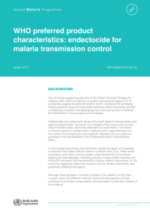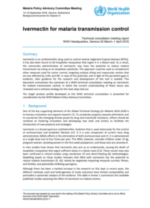DEEP DIVE
Ivermectin for malaria
24/10/2018
31/01/2025
This is an active Deep Dive and we welcome your contributions! If you are currently involved or planning research activities on Ivermectin for malaria please contact MESA (mesa@isglobal.org) or or add your project to the database.
——
In order to eliminate malaria from endemic settings an integrated vector management approach is needed and to tackle residual transmission, there is a need to develop additional vector control strategies that complement Long Lasting Insecticide Nets (LLINs) and Indoor Residual Spraying (IRS) by targeting mosquitoes that feed or rest outdoors [ref].
The potential administration of the endectocide drug ivermectin to control malaria transmission is gaining increased attention from the scientific community. Nevertheless, in order to generate strong evidence on whether this strategy should be added to the existing malaria control efforts, a common research agenda is extremely needed [ref]. In 2017, a multidisciplinary group of global health experts convened with the objective of defining a clear pathway for the evaluation of ivermectin as a vector control tool against malaria and for its subsequent implementation. The conclusions of that meeting were published in: A Roadmap for the Development of Ivermectin as a Complementary Malaria Vector Control Tool [ref].
Since then, several projects and clinical trials have been conducted on a ivermectin for malaria indication proof of concept. The overall goal of this deep dive is to describe the landscape of current research projects tackling ivermectin for vector control, with a focus on malaria vectors, through the creation of a comprehensive database of the current research activities.
Ivermectin for Neglected Tropical Diseases (NTDs)
Ivermectin has been widely used by the NTDs community for a long time. In the table below, you can consult the trials testing ivermectin for soil-transmitted helminths, dengue, lymphatic filariasis, trachoma, onchocerciasis, and scabies. The information has been last updated in December 2019, and the data has been retrieved from clinicaltrials.gov.

Total
projects

Total funding
amount



